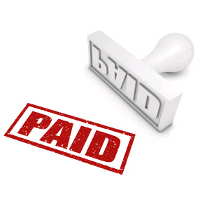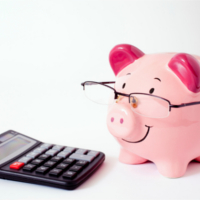10 Tips for Paying Off Credit Card Debt
Ready to pay off your credit card debt? Here are some practical ways you can quickly tackle your maxed out cards and take your first real steps toward getting out of debt.
1. Start by Setting a Goal
It’s important to set for yourself realistic goals for paying off your high interest credit cards as well as other types of consumer debt (overdraft, line of credit, vehicle loans). While it is easy to run up balances in a short period of time, it takes time and self-discipline to pay them off. Monitor your progress regularly to help you stay on track and motivated to reach your goals. You can learn more about how to set S.M.A.R.T. financial goals here.
2. Put Your Credit Cards on Ice
 Sorry to say, but getting out of debt requires taking those credit cards out of your wallet so you’re not tempted to use them. Put them away, or freeze them into a bucket of ice, until you have completely paid off your outstanding balances. Paying for your purchases with cash instead of credit will help you separate your needs from wants, remain conscious about your spending, and make you think twice before spending money.
Sorry to say, but getting out of debt requires taking those credit cards out of your wallet so you’re not tempted to use them. Put them away, or freeze them into a bucket of ice, until you have completely paid off your outstanding balances. Paying for your purchases with cash instead of credit will help you separate your needs from wants, remain conscious about your spending, and make you think twice before spending money.
3. Prioritize Your Debts – Credit Cards, Loans, Mortgages and So On...
Make a complete list of all of your debts (outstanding balances, interest rates and charges) and prioritize them in order of importance. Mortgage payments and vehicle payments are typically at the top of most lists as these provide your shelter and transportation to get to and from your job.
Priorities will be different for everyone. Many people want to get rid of their highest interest rate debts first, and others have specific debts like payday loans they want to eliminate first. You should decide the order in which you will pay off your debts.
4. Trim Your Expenses to Free Up Some Cash
One way to speed up your debt repayment and get out of debt fast is by reviewing your monthly expenses and looking for opportunities to cut your costs. Start by tracking your spending for a two-week period to become aware of where your money is going (one month is even better). You may be surprised to learn that making your cup of coffee in the morning instead of buying a $3 specialty drink will save you over $1,000 a year! Check your spending to see if you can find more ways to save some money.
If you'd like a lot more ideas of ways to save on expenses, we offer tons of ideas on our educational website, MyMoneyCoach.ca. Here are some great places to look there:
5. Create a Monthly Spending Plan
 To learn how to get out of debt and to stop borrowing from your credit cards again and again, you will need to create a monthly spending plan for your money. Not only will this ensure you are living within your means (and not above your income, which is where credit card debt comes from), but it will also give you a set timeline on when you can expect to get debt free.
To learn how to get out of debt and to stop borrowing from your credit cards again and again, you will need to create a monthly spending plan for your money. Not only will this ensure you are living within your means (and not above your income, which is where credit card debt comes from), but it will also give you a set timeline on when you can expect to get debt free.
Want some help creating a plan? We’ve created an interactive, budget calculator spreadsheet that will guide you through the process and make the idea of budgeting way less painful. This will help you stay within your budget and maximize your ability to pay down your debts. We also have lots of other budgeting resources if you prefer other ways of budgeting.
6. Use the Most Popular Way To Get Out of Credit Card Debt - Some Claim It's the Best
People have found that the best way to get out of credit card debt is to do so strategically. After paying debts that are on fixed monthly payments (mortgages, vehicle, and term loans), make the minimum payments required on your credit cards with the lowest interest rates and maximize your payments on the credit cards with the highest interest rates. Once a debt is paid, use this extra money to pay down the credit card with next highest interest rate. This will save you money and help you pay down all of your debts faster.
7. Another Popular Debt Reduction Strategy That's Highly Motivating - The Snowball Method
Another method a lot of people like to use to get out debt is to pay off small credit card balances first. This can have a powerful psychological effect on many people because it can feel like they are making progress sooner. This can be very encouraging and provides a lot of people with motivation to keep paying down their debt. Here's how it works:
- Use any extra money you can come up with to pay off your credit card with the smallest balance first (ignore the interest rates and just focus on the card with the smallest balance). Paying off this card will give you a quick win and a sense of satisfaction and accomplishment.

- Don't pocket the minimum monthly payment that you used to pay every month on your smallest credit card. Instead, start paying down your next smallest credit card balance with that money. Of course, throw all the extra money you can at this debt to get it paid off as quickly as possible, but the key here is to free up money as you pay off your smallest credit card balances first. The monthly payments you free up will help you pay down the next larger credit card even faster. By doing this, you're essentially creating a snowball effect.
- Repeat the process of focusing on paying off your next smallest credit card balance using the money freed up from the smaller cards you paid off earlier. With the snowballing monthly payment this method creates, your debts will get paid down faster and faster as you go, and you'll get more and more motivated as you pay off one card after another.
Some people like to debate which debt payoff methods is best. While paying off the highest interest rates first is mathematically correct, the best method is whichever one works for you. Some people are motivated by numbers and some are motivated by feeling that they accomplished something and seeing that they are actually making progress. You know yourself. Go with the method that you think will work best for the way you tick.
Once you've paid off a card, cut it up, and cancel the account. Most people only need one or two credit cards.
"I was in a financial hole, owing a little more than $10,000 to several credit card companies. The interest alone was burying me, and I couldn't seem to make any progress paying it off. I contact the Credit Counselling Society to see if they could help. They showed me how to do a proper budget, contacted all my creditors for me, and got my interest dropped so I only had to pay off what I had actually spent. They got me on a payment plan that took into consideration my income and other living expenses & bills. I had paid it all off in a little over 2 years. 10 years later, I have rebuilt my credit score to an excellent 750, and I have used the budgeting skills I learned to use my credit cards wisely and live within my means. I would highly recommend this company to anyone who wants to get out of debt and start building their credit again."
- April
8. Use Savings to Pay Debt Down Faster
Many people regularly contribute to a savings plan, which is great, but consider that this is money that could help you pay down what you owe faster. Once you have established an emergency fund and are saving for irregular expenses, you may want to consider suspending extra payments to Canada Savings Bonds or other savings accounts until you have paid off what you owe. This is especially beneficial for those who aren’t saving for something specific like vehicle repairs.
The money you save by paying down your debts faster will be substantially higher than the interest you will earn in a savings account. Also consider using income tax refunds, pay increases, or other unexpected funds to pay down your debts. For even more ideas of where you can find money to help pay down your debt, have look here (the ideas are about all the places you can find money to save. You're just going to use the money to pay down debt instead).
9. A Debt Consolidation Loan or Balance Transfer Could be a Good Option
When used correctly*, debt consolidation loans and balance transfers can be excellent ways to get out of debt. Consider consolidating your debts with a consolidation loan or transferring your credit card balances to a low rate credit card. Carefully investigate the terms, conditions, any hidden fees as well as the overall interest savings you may realize before you commit to this solution.
Cut up and cancel your credit cards if you choose this option, otherwise you may be tempted to continue using them and further increase your debt load.
*Unfortunately, debt consolidation loans don't seem to help the majority of people get ahead. We believe the reason for this is that when people obtain debt consolidation loans, they don't change their behaviours that created the debt in the first place. To get ahead using a debt consolidation loan, make sure you track your spending for at least 2 weeks, create a budget, follow it, and make sure you're not spending more than you earn. Otherwise you'll end up like so many others and need another debt consolidation loan once you finish paying off your first one.
10. Refinance Your Mortgage
 If you own your own home, you may have enough equity to consolidate all of your debts into your mortgage. If you don’t have much equity in your home, additional mortgage insurance costs may be expensive. Make sure you consider all of your options and seek advice from someone other than your lender (since they have a vested interest in getting you to choose this option).
If you own your own home, you may have enough equity to consolidate all of your debts into your mortgage. If you don’t have much equity in your home, additional mortgage insurance costs may be expensive. Make sure you consider all of your options and seek advice from someone other than your lender (since they have a vested interest in getting you to choose this option).
Just like with a debt consolidation loan, when you consolidate debts into your mortgage, you also need to create a budget that allocates money to savings. If you don’t, you’ll always be tempted to borrow more when “emergencies” arise. Repeatedly using your home as an ATM can set you up to face retirement with a lot of debt, no assets, and no savings.
If normal banks and credit unions aren't able to help you with refinancing your mortgage, don't immediately turn to a home equity lender. Instead, speak with one of our Credit Counsellors. They'll help you explore all your options and help you put together an effective plan to pay off all your credit card debt. Their may even be options available to you that don't involve using the equity in your home.
Contact the Credit Counselling Society for Personalized Tips on Paying Off Credit Card Debt
If you are overwhelmed by your current financial circumstances or have difficulty maintaining a monthly budget, we can help you by providing personalized tips for paying off credit card debt. We’ll review your financial situation with you and explore all of the different ways you can get rid of your debt. There are even debt relief and debt repayment programs that may be a possibility depending on your situation. Contact us so we can help with confidential, non-judgmental, and objective advice, guidance, and information.
Here are some additional resources that may be helpful to you.

12 Fastest & Most Effective Ways to Get Out of Debt
See what will work best for your situation. The more of these you can apply, the faster you will get out of debt.




